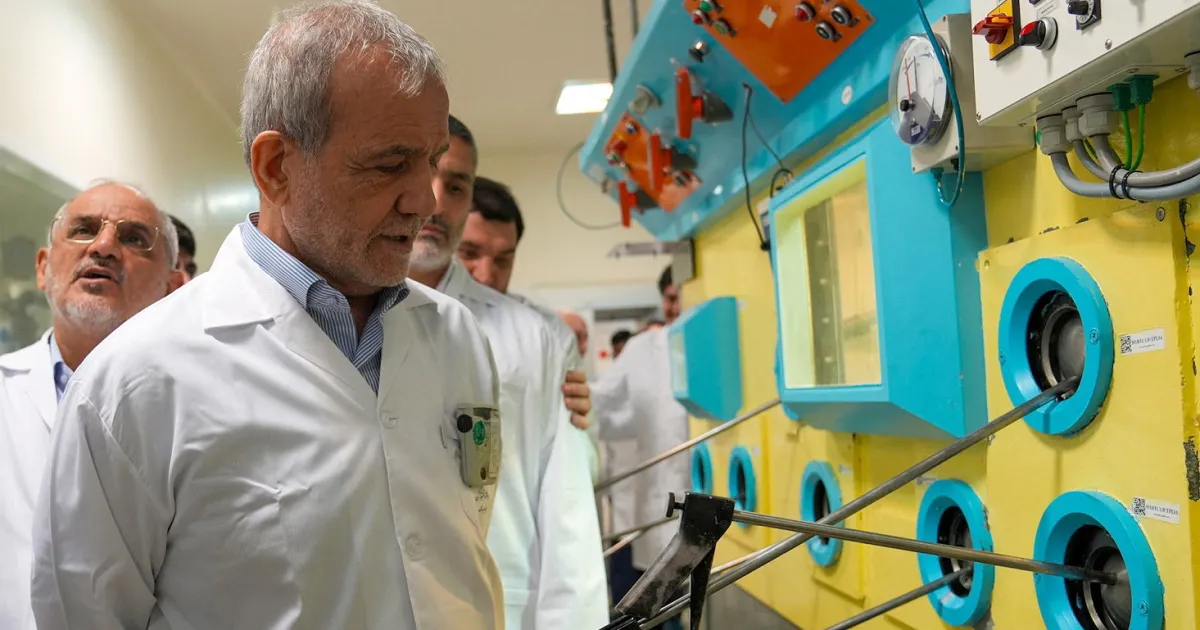Iran suggests it could dilute highly enriched uranium for sanctions relief | Nuclear Energy News
Iran’s atomic energy chief says Tehran is open to diluting its highly enriched uranium if the United States ends sanctions, signalling flexibility on a key demand by the US.
Mohammad Eslami made the comments to reporters on Monday, saying the prospects of Iran diluting its 60-percent-enriched uranium, a threshold close to weapons grade, would hinge on “whether all sanctions would be lifted in return”, according to Iran’s state-run IRNA news agency.
Eslami did not specify whether Iran expected the removal of all sanctions or specifically those imposed by the US.
Diluting uranium means mixing it with blend material to reduce its enrichment level. According to the United Nations nuclear watchdog, Iran is the only state without nuclear weapons enriching uranium to 60 percent.
US President Donald Trump has repeatedly called for Iran to be subject to a total ban on enrichment, a condition unacceptable to Tehran and far less favourable than a now-defunct nuclear agreement reached with world powers in 2015.
Iran maintains it has a right to a civilian nuclear programme under the provisions of the nuclear Non-Proliferation Treaty, to which it and 190 other countries are signatories.
Eslami made his comments on uranium enrichment as the head of Iran’s Supreme National Security Council, Ali Larijani, prepares to head on Tuesday to Oman, which has been hosting mediated negotiations between the US and Iran.
Al Jazeera’s Ali Hashem, reporting from Tehran, said Larijani, one of the most senior officials in Iran’s government, is likely to convey messages related to the ongoing talks.
Trump said talks with Iran would continue this week.
Negotiations ‘very serious’
Both the US and Iran have given mixed signals about their progress in the negotiations. Iranian Foreign Minister Abbas Araghchi said Iran is “very serious in negotiations” and is eager to “achieve results”. However, he said, “There is a wall of mistrust towards the United States, which stems from America’s own behaviour.”
Iranian President Masoud Pezeshkian said the ongoing negotiations are an “important opportunity to reach a fair and balanced solution”, IRNA reported. He stressed that “Iran seeks guarantees for its nuclear rights” and the lifting of “unjust sanctions”, the agency added.
Trump, for his part, praised the latest round of talks on Friday as “very good” but continued to warn of “steep consequences” for Iran if it does not strike a deal.
“They want to make a deal as they should want to make a deal,” the US president said. “They know the consequences if they don’t.”
Before the two sides agreed to talks, Trump had repeatedly threatened Iran with a “far worse” attack than the US strikes on three Iranian nuclear facilities during June’s 12-day Israel-Iran war. He has escalated the pressure by deploying an aircraft carrier and accompanying warships to the Middle East.
Trump is expected on Wednesday to meet with visiting Israeli Prime Minister Benjamin Netanyahu, who is pushing the US to take a hardline stance in its negotiations with Iran, demanding not just concessions on its nuclear programme but also on its ballistic missiles and regional alliances.
Andreas Krieg, an associate professor in security studies at King’s College London, said the US and Iran appear to be “pivoting closer to a deal” than they were several weeks ago, even though there’s still a high risk of conflict.
“The [US] ‘armada’, as Trump calls it, is still in the area, so we still have that coercion going against the [Iranian] regime by the Americans,” Krieg told Al Jazeera. “But it seems to be fruitful in the way that the pressure works, and the Iranians have to make concessions.”
He added: “All the messaging from the Gulf countries – from Qatar, from Oman – from everyone involved, including from the Americans, has been very positive. And the Iranians’ feedback themselves was very positive.
“I think the problem that we have right now is how do we translate this momentum that we have right now on a strategic framework into the nitty-gritty of the details.”
